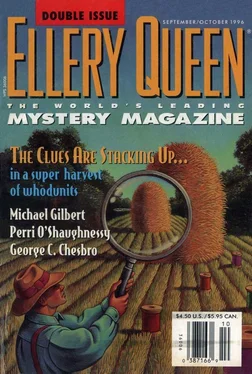Doug Allyn - v108 n03-04_1996-09-10
Здесь есть возможность читать онлайн «Doug Allyn - v108 n03-04_1996-09-10» весь текст электронной книги совершенно бесплатно (целиком полную версию без сокращений). В некоторых случаях можно слушать аудио, скачать через торрент в формате fb2 и присутствует краткое содержание. Город: Dell Magazines, Год выпуска: 1996, Издательство: Dell Magazines, Жанр: Детектив, на английском языке. Описание произведения, (предисловие) а так же отзывы посетителей доступны на портале библиотеки ЛибКат.
- Название:v108 n03-04_1996-09-10
- Автор:
- Издательство:Dell Magazines
- Жанр:
- Год:1996
- Город:Dell Magazines
- ISBN:нет данных
- Рейтинг книги:4 / 5. Голосов: 1
-
Избранное:Добавить в избранное
- Отзывы:
-
Ваша оценка:
- 80
- 1
- 2
- 3
- 4
- 5
v108 n03-04_1996-09-10: краткое содержание, описание и аннотация
Предлагаем к чтению аннотацию, описание, краткое содержание или предисловие (зависит от того, что написал сам автор книги «v108 n03-04_1996-09-10»). Если вы не нашли необходимую информацию о книге — напишите в комментариях, мы постараемся отыскать её.
v108 n03-04_1996-09-10 — читать онлайн бесплатно полную книгу (весь текст) целиком
Ниже представлен текст книги, разбитый по страницам. Система сохранения места последней прочитанной страницы, позволяет с удобством читать онлайн бесплатно книгу «v108 n03-04_1996-09-10», без необходимости каждый раз заново искать на чём Вы остановились. Поставьте закладку, и сможете в любой момент перейти на страницу, на которой закончили чтение.
Интервал:
Закладка:
She remembered being surprised by the intensity of her anger at the article and at Hal, who, after all, had only brought it to her attention. However, he was not long in observing that while he could take no responsibility for the arbitrary action of the zoo, its perfidy ought to make her consider how she was wasting her time. She had no more input into decision making at the zoo than any other typist. Why should she drive to Denver two days a week in all kinds of weather? There had already been an early snow. Let her find work to do in Boulder, if that’s all she wanted.
How confident he was in his assessment of her situation. How satisfied in his judgment.
She went to her room and got out the brochure on Churchill again. She sat on the edge of her bed and read it carefully, smoothing the pages grown soft and furry with handling. Touching them was like sliding open a door in her mind. Through it she could see the polar ice stretching away to the very top of the world.
That night, after Hal had retired, she went noiselessly down the stair, carefully avoiding the motionless tubing, to the oxygen tanks in the hall. She turned the black knob on the top of the master cylinder from 8 to 7, all the way down to 1. It took her almost an hour to do so, gradually reducing the flow so as not to disturb him. Then she went to bed.
The next morning she got up early and gradually turned the setting back to 8. Hal seemed little different, although he complained of tiredness. She had been tempted to leave the setting on 1, since she knew he would not go near the tanks. He despised his dependency on them. But she thought that imprudent and unnecessary.
She repeated that activity for more than a week without any noticeable change in his behavior, though he might have become quieter, more introspective. She felt only a certain curiosity about his condition. She was not impatient.
Then one morning before she left for Denver, he complained of weakness and had her make a doctor’s appointment for him for the following day. When she came home from the zoo that afternoon, she found him dead in his leather chair.
The travel agent had been very pleased to be able to find her a room in Churchill at that time of year. It was the peak time to see the bears, and with all the tourists flying in, accommodations were scarce. And he had managed to get her space on one of the buses for three of the six days of the tour.
She had been disappointed in Manitoba. She had expected more snow, but it lay thinly, streaking a desolate plain dotted by many ice-covered ponds. Churchill itself was a small collection of low buildings set on the edge of the gray gravel shore of Hudson Bay under a misting sky. She was told that some of the trees — all of which were less than four feet high — were hundreds of years old. Everything in that bleak country seemed to hug the earth.
The pilot of the early flight from Winnipeg had pointed out some bears on the approach to the Churchill airport, but she had an aisle seat and by the time she leaned across her seatmate, the plane was touching down.
Churchill was cold and damp, and she was tired, but there was a tour scheduled after lunch. The tour bus looked very much like a school bus, but it was heavily reinforced with steel and rolled on huge tires so soft they would do less damage to the fragile environment than a person walking. Or so they said, but the buses following one another had carved a great muddy track across the tundra as they slowly bumped over hummocks and through shallow pools, crushing the ice beneath them.
She was extremely uncomfortable on the bus. Her fellow passengers dropped the windows excitedly whenever they wished to take a picture unhindered by the glass, and they wished to take pictures every time they spotted a bear. Which was often. She was cold and hated being jostled as they jockeyed for position. The motor drives which advanced the film whined incessantly as the shutters clicked and clicked and clicked. They meant to have their trophies. Sarah had brought no camera.
The bears were part of a dull landscape studded with numerous large pale rocks and low, spindly shrubs. Sarah had a sudden sad longing for color. The lilacs along Speer were purple and white in the late spring. Hal’s roses had bloomed crimson and pink and yellow until the snow. Flagstaff still had its autumnal reds. Here it was as though wind and cold had leeched the land to bone. In all directions the plain stretched away perfectly flat.
Hudson Bay was a long thin line of dark water on the eastern horizon against a leaden sky. When the bus rolled to its edge, Sarah could see the ice forming a crumbling necklace along the shore.
Despite the repeated encouragements from the guide, Sarah did not leave the bus. She remained behind as her fellow tourists trooped uneasily across the tundra to take pictures of dun-colored lichen and stunted willows at the edges of frozen ponds.
Eventually they returned to town, and she was able to sit on the edge of her bed in the rather ordinary motel and rest and wait for dark, which was not long in coming. She delayed to let people going home from work clear the streets. Around six o’clock she left the motel and hurried along Kelsey, the main street of Churchill and the only one she had seen which was paved. The wind was stronger now, and the few people left on the street were hurrying too, hurrying toward light and warmth. She soon passed the cautionary row of signs bearing the image of the bear which marked the limit of the town. Then she was alone.
It was not so dark that she could not follow the tracks of the buses out of town and across the tundra, angling toward the bay. The only sound she could hear now over the wind was the icy mud crackling beneath her feet. From time to time she stopped and raised her head to the biting wind and tasted the air.
She didn’t see the bears until she was almost among them. In the darkness she had mistaken them for stones. As she drew nearer, she could see that there were four of them, probably all males. They lifted their heads, swinging their muzzles toward her. Behind them she could just make out the white-capped bay with its growing fringe of ice. Soon freeze-up would begin, and the bears would leave the land behind them. Soon they would be hunting the ringed seals, each bear making its solitary way over the great stretches of pack ice that rotated imperceptibly beneath it, drifting clockwise past Ellesmere Island, Point Barrow, New Siberian Islands, Franz Josef Land, Svalbard, Greenland. All countries were the same in the great polar night. The seals would come up to their breathe holes in the ice, and hunting would be good. Now the bears were coming to the end of their long summer fasts, and they would be very hungry.
She quickened her stride toward them, toward the sea and toward the dark, where they were waiting to take her to the top of the world.
Late Night Fright
by Billy James Kirk
© 1996 by Billy James Kirk

Late one night about half past two,
I heard footsteps enter my room.
Pulling the covers ’round me tight,
I closed my eyes half dead in fright.
A shadow hung above my face,
My chiming clock made my pulse race.
Ever so close the breathing came,
I shook in fear beneath its flame
Then toward my face a paw did swing,
My face, it turned three shades of green,
It stopped, then gave my nose a pat,
And I was staring at my cat.
Devil’s Wind
by Michael A. Black
© 1996 by Michael A. Black
Chicagoan Michael Black began writing fiction seriously in the 1970s, at about the same time he became an officer on the Matteson, Illinois police force. The following piece marks a change for Mr. Black, whose previous work, published in magazines such as Hardboiled , has focused more often on crime than on the traditional whodunit.
Читать дальшеИнтервал:
Закладка:
Похожие книги на «v108 n03-04_1996-09-10»
Представляем Вашему вниманию похожие книги на «v108 n03-04_1996-09-10» списком для выбора. Мы отобрали схожую по названию и смыслу литературу в надежде предоставить читателям больше вариантов отыскать новые, интересные, ещё непрочитанные произведения.
Обсуждение, отзывы о книге «v108 n03-04_1996-09-10» и просто собственные мнения читателей. Оставьте ваши комментарии, напишите, что Вы думаете о произведении, его смысле или главных героях. Укажите что конкретно понравилось, а что нет, и почему Вы так считаете.












